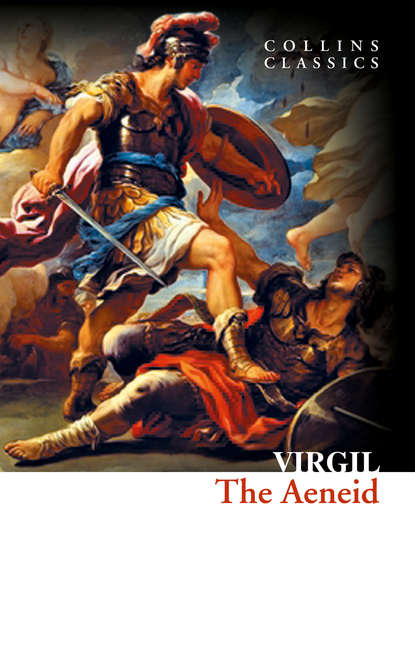The Grecians enter and possess the place.
“Perhaps you may of Priam’s fate enquire.
He, when he saw his regal town on fire,
His ruin’d palace, and his ent’ring foes,
On ev’ry side inevitable woes,
In arms, disus’d, invests his limbs, decay’d,
Like them, with age; a late and useless aid.
His feeble shoulders scarce the weight sustain;
Loaded, not arm’d, he creeps along with pain,
Despairing of success, ambitious to be slain!
Uncover’d but by heav’n, there stood in view
An altar; near the hearth a laurel grew,
Dodder’d with age, whose boughs encompass round
The household gods, and shade the holy ground.
Here Hecuba, with all her helpless train
Of dames, for shelter sought, but sought in vain.
Driv’n like a flock of doves along the sky,
Their images they hug, and to their altars fly.
The Queen, when she beheld her trembling lord,
And hanging by his side a heavy sword,
‘What rage,’ she cried, ‘has seiz’d my husband’s mind?
What arms are these, and to what use design’d?
These times want other aids! Were Hector here,
Ev’n Hector now in vain, like Priam, would appear.
With us, one common shelter thou shalt find,
Or in one common fate with us be join’d.’
She said, and with a last salute embrac’d
The poor old man, and by the laurel plac’d.
Behold! Polites, one of Priam’s sons,
Pursued by Pyrrhus, there for safety runs.
Thro’ swords and foes, amaz’d and hurt, he flies
Thro’ empty courts and open galleries.
Him Pyrrhus, urging with his lance, pursues,
And often reaches, and his thrusts renews.
The youth, transfix’d, with lamentable cries,
Expires before his wretched parent’s eyes:
Whom gasping at his feet when Priam saw,
The fear of death gave place to nature’s law;
And, shaking more with anger than with age,
‘The gods,’ said he, ‘requite thy brutal rage!
As sure they will, barbarian, sure they must,
If there be gods in heav’n, and gods be just—
Who tak’st in wrongs an insolent delight;
With a son’s death t’ infect a father’s sight.
Not he, whom thou and lying fame conspire
To call thee his—not he, thy vaunted sire,
Thus us’d my wretched age: the gods he fear’d,
The laws of nature and of nations heard.
He cheer’d my sorrows, and, for sums of gold,
The bloodless carcass of my Hector sold;








 Рейтинг:
0
Рейтинг:
0